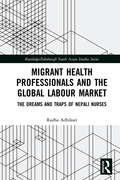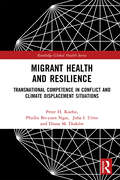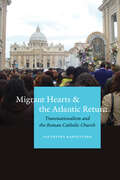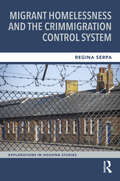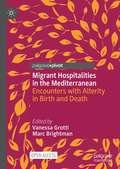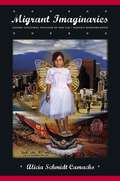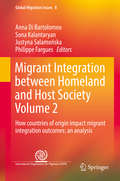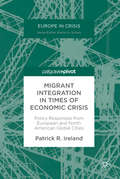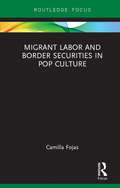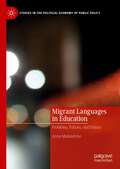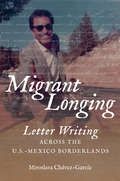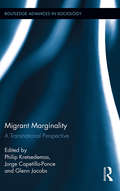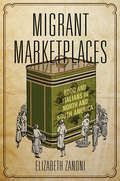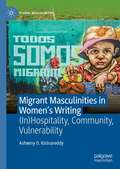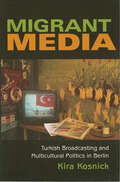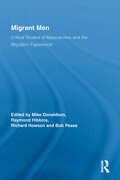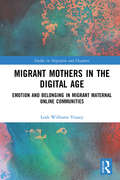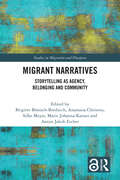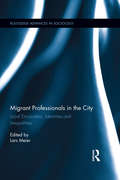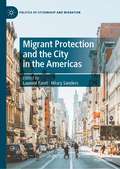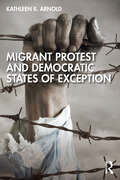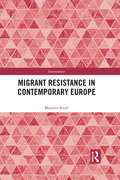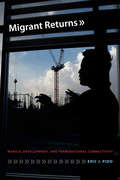- Table View
- List View
Migrant Health Professionals and the Global Labour Market: The Dreams and Traps of Nepali Nurses (Routledge/Edinburgh South Asian Studies Series)
by Radha AdhikariThis book offers a fresh perspective on gender debates in Nepal and analyses how the international migration of the first generation of professional female Nepali nurses has been a catalyst for social change. With unprecedented access to study participants in Nepal (the source country), following them and their networks in the UK (the destination country), this ethnographic study explores Nepali nurses’ migration journeys, relocation experiences, and their international migration ‘dreams’ and aspirations. It illustrates how migrant nurses strive to manage social and professional difficulties as they work towards achieving their ultimate migration aims. The book shows that nursing shortages and international nurse migration are isseus of gender, on a global scale, and that the current trend of privatisation in health systems makes the labour market vulnerable, and stimulates international migration of health professionals. Arguing that international nurse migration is an integral part of the globalisation of health, the author highlights key policy strategies that are useful for global nursing and health workforce management. A well-informed and much-needed study of nurse migration in the global healthcare market, this book will be of interest to professionals and academics working in nursing studies, health and social care studies, gender and international migration studies, and global health studies, as well as South Asian studies.
Migrant Health and Resilience: Transnational Competence in Conflict and Climate Displacement Situations (Routledge Global Health Series)
by Peter H. Koehn Juha I. Uitto Phyllis Bo-Yuen Ngai Diana M. DiakówIn an era of escalating conflict-induced and climate-induced migration and cross-border interaction, transnational-competence (TC) preparation for displaced persons, members of their host communities, humanitarian responders, and health-care professionals is increasingly critical. Building on insights from those engaged with a range of humanitarian crises and global-justice contexts, along with multidisciplinary research findings, this cutting-edge volume provides practical guidelines for preparing stakeholders for effective short-term and long-term responses to challenges arising in the wake of population dislocation generated by armed conflict, persecution, and climate change. Addressing the need to equip humanitarian care-givers and care-receivers with valuable skills for working together across barriers and boundaries, the guidance presented in the book enables educators, trainers, and field-based multinational and local responders to enhance and evaluate the quality and sustainability of humanitarian efforts that promote and bolster resilience and belonging and augment well-being, justice, and sustainable development. It features comprehensive TC-teaching and learning strategies coupled with tailored on-site and remote approaches and methods. Authoritative and insightful, Migrant Health and Resilience will be essential reading for the staff of NGOs, international organizations, national and local governments, and professional bodies working in development and humanitarian-crisis contexts, as well as for students, higher-education instructors, scholars, and evaluators.
Migrant Hearts and the Atlantic Return: Transnationalism and the Roman Catholic Church
by Valentina NapolitanoMigrant Hearts and the Atlantic Return examines contemporary migration in the context of a Roman Catholic Church eager to both comprehend and act upon the movements of peoples. Combining extensive fieldwork with lay and religious Latin American migrants in Rome and analysis of the Catholic Church’s historical desires and anxieties around conversion since the period of colonization, Napolitano sketches the dynamics of a return to a faith’s putative center. Against a Eurocentric notion of Catholic identity, Napolitano shows how the Americas reorient Europe.Napolitano examines both popular and institutional Catholicism in the celebrations of the Virgin of Guadalupe and El Senor de los Milagros, papal encyclicals, the Latin American Catholic Mission, and the order of the Legionaries of Christ. Tracing the affective contours of documented and undocumented immigrants’ experiences and the Church’s multiple postures toward transnational migration, she shows how different ways of being Catholic inform constructions of gender, labor, and sexuality whose fault lines intersect across contemporary Europe.
Migrant Homelessness and the Crimmigration Control System (Explorations in Housing Studies)
by Regina SerpaMigrant Homelessness and the Crimmigration Control System offers new insights into the drivers of homelessness following migration by unpacking the housing consequences of ‘crimmigration’ control systems in the US and the UK. The book advances ‘housing sacrifice’ as a concept to understand journeys in and out of homelessness and the coping strategies migrants employ. Undergirded by persuasive empirical research, it offers a compelling case for a ‘social citizenship’ right to housing guaranteed across social, political and civil realms of society. The book is structured around the 30 life stories of people who have migrated to the capital cities of Boston and Edinburgh from Central America and Eastern Europe. The narratives are complemented by interviews with a range of stakeholders (including frontline caseworkers, activists and policymakers). Guided by the tenets of critical realist theory, this book offers a biographical inquiry into the intersections of race, class and gender and provides insight into the everyday precarity homeless migrants face, by listening to them directly. It will be of interest to students, scholars, and policymakers across a range of fields including housing, immigration, criminology, sociology, and human geography.
Migrant Homelessness and the Crimmigration Control System (ISSN)
by Regina SerpaMigrant Homelessness and the Crimmigration Control System offers new insights into the drivers of homelessness following migration by unpacking the housing consequences of ‘crimmigration’ control systems in the US and the UK. The book advances ‘housing sacrifice’ as a concept to understand journeys in and out of homelessness and the coping strategies migrants employ. Undergirded by persuasive empirical research, it offers a compelling case for a ‘social citizenship’ right to housing guaranteed across social, political and civil realms of society. The book is structured around the 30 life stories of people who have migrated to the capital cities of Boston and Edinburgh from Central America and Eastern Europe. The narratives are complemented by interviews with a range of stakeholders (including frontline caseworkers, activists and policymakers). Guided by the tenets of critical realist theory, this book offers a biographical inquiry into the intersections of race, class and gender and provides insight into the everyday precarity homeless migrants face, by listening to them directly. It will be of interest to students, scholars, and policymakers across a range of fields including housing, immigration, criminology, sociology, and human geography.
Migrant Hospitalities in the Mediterranean: Encounters with Alterity in Birth and Death
by Marc Brightman Vanessa GrottiThis open access book applies insights from the anthropology of hospitality to illuminate ethnographic accounts of migrant reception in various parts of the Mediterranean. The contributors ground the idea and practice of hospitality in concrete ethnographic settings and challenge how the casual usage of Derridean or Kantian notions of hospitality can blur the boundaries between social scales and between metaphor and practice. Host-guest relations are multiplied through pregnancy and childbirth, and new forms of hospitality emerge with the need to offer mortuary practices for dead strangers, helping to illuminate the spatial and scalar dimensions of morality and politics in Mediterranean migrant reception.
Migrant Imaginaries: Latino Cultural Politics in the U.S.-Mexico Borderlands (Nation of Nations #12)
by Alicia Schmidt CamachoWinner of the 2009 Lora Romero First Book Prize from the American Studies Association2009 Choice Outstanding Academic TitleExplores the transnational movements of Mexican migrants, including their expressive culture and social movement practicesMigrant Imaginaries explores the transnational movements of Mexican migrants in pursuit of labor and civil rights in the United States from the 1920s onward. Working through key historical moments such as the 1930s, the Chicano Movement, and contemporary globalization and neoliberalism, Alicia Schmidt Camacho examines the relationship between ethnic Mexican expressive culture and the practices sustaining migrant social movements. Combining sustained historical engagement with theoretical inquiries, she addresses how struggles for racial and gender equity, cross-border unity, and economic justice have defined the Mexican presence in the United States since 1910.Schmidt Camacho covers a range of archives and sources, including migrant testimonials and songs, Amrico Parede’s last published novel, The Shadow, the film Salt of the Earth, the foundational manifestos of El Movimiento, Richard Rodriguez’s memoirs, narratives by Marisela Norte and Rosario Sanmiguel, and testimonios of Mexican women workers and human rights activists, as well as significant ethnographic research. Throughout, she demonstrates how Mexicans and Mexican Americans imagined their communal ties across the border, and used those bonds to contest their noncitizen status. Migrant Imaginaries places migrants at the center of the hemisphere’s most pressing concerns, contending that border crossers have long been vital to social change.
Migrant Integration between Homeland and Host Society Volume 2
by Philippe Fargues Anna Di Bartolomeo Sona Kalantaryan Justyna SalamońskaThis book provides solid empirical evidence into the role that countries and communities of origin play in the migrant integration processes at destination. Coverage explores several important questions, including: To what extent do policies pursued by receiving countries in Europe and the US complement or contradict each other? What effective contribution do they make to the successful integration of migrants? What obstacles do they put in their way? This title is the second of two complementary volumes, each of which is designed to stand alone and provide a different approach to the topic. Here, renowned contributors present evidence from the studies of 55 origin countries on five continents and 28 countries of destination in Europe where both quantitative and qualitative research was conducted. In addition, the chapters detail results of a unique worldwide survey of 900 organisations working on migrant integration and diaspora engagement. The results draw on an innovative methodology and new approaches to the analysis of large-scale survey data. This examination into the tensions between integration policies and diaspora engagement policies will appeal to academics, policymakers, integration practitioners, civil society organisations, as well as students. Overall, the chapters provide empirical evidence that builds upon a theoretical framework developed in a complementary volume: Migrant integration between Homeland and Host society. Vol. 1. Where does the country of origin fit? by A. Unterreiner, A. Weinar. and P. Fargues.
Migrant Integration in Times of Economic Crisis
by Patrick R. IrelandThis book examines how the severe economic downturn following the 2007-2008 financial crisis affected the structural integration and quality of life of urban migrants in Europe and North America. It compares the experiences of migrants from Poland, Romania, Serbia, Pakistan, and Ghana in five similar, secondary global cities of Hamburg (Germany), Barcelona (Spain), Chicago (USA), Toronto (Ontario, Canada), and Montr#65533;al (Qu#65533;bec, Canada) over the period of 2000-2015. The work uses statistical analysis to gauge changes in residential segregation and structural integration (such as unemployment, poverty, and social assistance rates). It then provides qualitative analyses of individual city neighborhoods where the target migrant groups have settled, exploring each community's unique evolution and the ambivalent impact that local policy responses have had on their quality of life. With this study, researchers, instructors, students, and policymakers with an interest in migration, urban development, and global cities will be far more knowledgeable of both the potential and limits of policy efforts.
Migrant Labor and Border Securities in Pop Culture (Routledge Focus on Latina/o Popular Culture)
by Camilla FojasMigrant Labor and Border Securities in Pop Culture explores the conditions for migrant domestic, agricultural, and factory workers as that of continual crisis and examines how the borderlands are a workshop of neoliberalism. These borderland stories present a future of integrated networks in which the border is not just physical but temporal, separating the present time of crisis and migrant phobia, and a future of transborder interaction and settlement based on bridges and networks rather than walls and the proliferation of security technologies. Written in accessible prose for undergraduate and graduate students across American studies, immigration studies, media and cultural studies and more, this book examines the collective action seen in Latina/o cultural productions after the economic crisis and how they reach across racial and geographic lines to imagine new entities.
Migrant Languages in Education: Problems, Policies, and Politics (Studies in the Political Economy of Public Policy)
by Anna MalandrinoThis book examines language education policy in European migrant-hosting countries. By applying the Multiple Streams Framework to detailed case studies on Austria and Italy, it sheds light on the factors and processes that innovate education policy. The book illustrates an education policy design that values language diversity and inclusion, and compares underlying policymaking processes with less innovative experiences. Combining empirical analysis and qualitative research methods, it assesses the ways in which language is intrinsically linked to identity and political power within societies, and how language policy and migration might become a firmer part of European policy agendas. Sitting at the intersection between policy studies, language education studies and integration studies, the book offers recommendations for how education policy can promote a more inclusive society. It will appeal to scholars, practitioners and students who have an interest in policymaking, education policy and migrant integration.
Migrant Longing: Letter Writing across the U.S.-Mexico Borderlands (The David J. Weber Series in the New Borderlands History)
by Miroslava Chávez-GarcíaDrawing upon a personal collection of more than 300 letters exchanged between her parents and other family members across the U.S.-Mexico border, Miroslava Chavez-Garcia recreates and gives meaning to the hope, fear, and longing migrants experienced in their everyday lives both "here" and "there" (aqui y alla). As private sources of communication hidden from public consumption and historical research, the letters provide a rare glimpse into the deeply emotional, personal, and social lives of ordinary Mexican men and women as recorded in their immediate, firsthand accounts. Chavez-Garcia demonstrates not only how migrants struggled to maintain their sense of humanity in el norte but also how those remaining at home made sense of their changing identities in response to the loss of loved ones who sometimes left for weeks, months, or years at a time, or simply never returned. With this richly detailed account, ranging from the Mexican Revolution of the 1910s to the emergence of Silicon Valley in the late 1960s, Chavez-Garcia opens a new window onto the social, economic, political, and cultural developments of the day and recovers the human agency of much maligned migrants in our society today.
Migrant Marginality: A Transnational Perspective (Routledge Advances in Sociology #98)
by Philip Kretsedemas Glenn Jacobs Jorge Capetillo-PonceThis edited book uses migrant marginality to problematize several different aspects of global migration. It examines how many different societies have defined their national identities, cultural values and terms of political membership through (and in opposition to) constructions of migrants and migration. The book includes case studies from Western and Eastern Europe, North America and the Caribbean. It is organized into thematic sections that illustrate how different aspects of migrant marginality have unfolded across several national contexts. The first section of the book examines the limitations of multicultural policies that have been used to incorporate migrants into the host society. The second section examines anti-immigrant discourses and get-tough enforcement practices that are geared toward excluding and removing criminalized “aliens”. The third section examines some of the gendered dimensions of migrant marginality. The fourth section examines the way that racially marginalized populations have engaged the politics of immigration, constructing themselves as either migrants or natives. The book offers researchers, policy makers and students an appreciation for the various policy concerns, ethical dilemmas and political and cultural antagonisms that must be engaged in order to properly understand the problem of migrant marginality.
Migrant Marketplaces: Food and Italians in North and South America
by Elizabeth ZanoniItalian immigrants to the United States and Argentina hungered for the products of home. Merchants imported Italian cheese, wine, olive oil, and other commodities to meet the demand. The two sides met in migrant marketplaces--urban spaces that linked a mobile people with mobile goods in both real and imagined ways. Elizabeth Zanoni provides a cutting-edge comparative look at Italian people and products on the move between 1880 and 1940. Concentrating on foodstuffs--a trade dominated by Italian entrepreneurs in New York and Buenos Aires --Zanoni reveals how consumption of these increasingly global imports affected consumer habits and identities and sparked changing and competing connections between gender, nationality, and ethnicity. Women in particular--by tradition tasked with buying and preparing food--had complex interactions that influenced both global trade and their community economies. Zanoni conveys the complicated and often fraught values and meanings that surrounded food, meals, and shopping.
Migrant Masculinities in Women’s Writing: (In)Hospitality, Community, Vulnerability (Global Masculinities)
by Ashwiny O. KistnareddyThis book examines the representation of masculinities in contemporary texts written by women who have immigrated into France or Canada from a range of geographical spaces. Exploring works by Léonora Miano (Cameroon), Fatou Diome (Senegal), Assia Djebar, Malika Mokeddem (Algeria), Ananda Devi (Mauritius), Ying Chen (China) and Kim Thúy (Vietnam), this study charts the extent to which migration generates new ways of understanding and writing masculinities. It draws on diverse theoretical perspectives, including postcolonial theory, affect theory and critical race theory, while bringing visibility to the many women across various historical and geographical terrains who write about (im)migration and the impact on men, even as these women, too, acquire a different position in the new society.
Migrant Media: Turkish Broadcasting and Multicultural Politics in Berlin (New Anthropologies of Europe)
by Kira KosnickIn this innovative and thought-provoking study, Kira Kosnick explores the landscape of Turkish-language broadcasting in Berlin. From 24-hour radio broadcasting in Turkish to programming on Germany's national public broadcasting and local public access channels, Germany's largest immigrant minority has made its presence felt in German media. Satellite dishes have appeared in migrant neighborhoods all over the city, giving viewers access to Kurdish channels and broadcasts from Turkey. Kosnick draws on interviews with producers, her own participation in production work, and analysis of programs to elaborate a new approach to "migrant media" in relation to the larger cultural and political spaces through which immigrant life is imagined and created.
Migrant Men: Critical Studies of Masculinities and the Migration Experience (Routledge Research in Gender and Society)
by Richard Howson Bob Pease Mike Donaldson Raymond HibbinsThis edited volume contributes an important collection of chapters to the growing theoretical and empirical work being undertaken at the international level on men and migration. The chapters presented here focus on what we might call ‘migratory masculinities': the experiences men have of masculinity upon immigration into another national, ethnic, and cultural context. How do these men (re)construct their conceptions of masculinity? Where are the points of tension, ambivalence or assimilation in this process? Featuring interviews and data drawn from migrants working and living in Australia, this book explores how the gender identity of men from non-English-speaking backgrounds is influenced by the experiences of migration and settlement in an English-speaking culture, across various cultural spheres such as work, leisure, family life and religion.
Migrant Mothers in the Digital Age: Emotion and Belonging in Migrant Maternal Online Communities (Studies in Migration and Diaspora)
by Leah Williams VeazeyThis book explores the experiences of migrant mothers through the lens of the online communities they have created and participate in. Examining the ways in which migrant mothers build relationships with each other through these online communities and find ways to make a place for themselves and their families in a new country, it highlights the often overlooked labour that goes into sustaining these groups and facilitating these new relationships and spaces of trust. Through the concept of ‘digital community mothering,’ the author draws links to Black feminist scholarship that has shed light on the kinds of mothering that exist beyond the mother–child dyad. Providing new insights into the experiences of women who mother ‘away from home’ in this contemporary digital age, this volume explores the concepts of imagined maternal communities, personal maternal narratives, and migrant maternal imaginaries, highlighting the ways in which migrant mothers imagine themselves within local, national, and diasporic maternal communities. As such, it will appeal to scholars and students with interests in migration and diaspora studies, contemporary motherhood and the sociology of the family, and modern forms of online sociality.
Migrant Narratives: Storytelling as Agency, Belonging and Community (Studies in Migration and Diaspora)
by Anastasia Christou Silke Meyer Brigitte Bönisch-Brednich Marie Johanna Karner Jakob Escher, Jakob EscherWith a focus on migrant narratives, or the storytelling about migration, this volume considers the ways in which migration is and has been shaped by individual and collective experiences of agency, belonging and community. Driven by an agenda of deep listening, each chapter presents a narrative directly derived from qualitative research, an outline of the methodological framing as well as narrative analysis. Through close attention to the narrative, its performative aspects and its ruptures and silences, authors identify patterns and material in the fabric of such telling and retelling of stories that open up new perspectives on the migrant experience. This book develops a methodology of ‘dwelling with stories’ that allows for sustained and slow interrogation of the migrant experience and the accompanying decisions that shape narratives around mobility across borders. Its structure is innovative by emphasising the migrant voice and reflecting on the scholars’ positionality, while also offering new theoretical contributions that will advance the field of narrative analysis. The book will appeal to academics, students and practitioners in a wide range of subject areas within the humanities and social sciences, including anthropology, sociology, human geography, migration/refugee/diaspora studies and oral history.
Migrant Narratives: Storytelling as Agency, Belonging and Community (Studies in Migration and Diaspora)
by Anastasia Christou Silke Meyer Brigitte Bönisch-Brednich Marie Johanna Karner Jakob Escher, Jakob EscherWith a focus on migrant narratives, or the storytelling about migration, this volume considers the ways in which migration is and has been shaped by individual and collective experiences of agency, belonging and community.Driven by an agenda of deep listening, each chapter presents a narrative directly derived from qualitative research, an outline of the methodological framing as well as narrative analysis. Through close attention to the narrative, its performative aspects and its ruptures and silences, authors identify patterns and material in the fabric of such telling and retelling of stories that open up new perspectives on the migrant experience. This book develops a methodology of "dwelling with stories" that allows for sustained and slow interrogation of the migrant experience and the accompanying decisions that shape narratives around mobility across borders. Its structure is innovative by emphasising the migrant voice and reflecting on the scholars’ positionality, while also offering new theoretical contributions that will advance the field of narrative analysis.The book will appeal to academics, students and practitioners in a wide range of subject areas within the humanities and social sciences, including anthropology, sociology, human geography, migration/refugee/diaspora studies and oral history.Chapter 5, 6, 7 and 8 of this book are freely available as a downloadable Open Access PDF at http://www.taylorfrancis.com under a Creative Commons [Attribution-Non Commercial-No Derivatives (CC-BY-NC-ND)] 4.0 license.
Migrant Professionals in the City: Local Encounters, Identities and Inequalities (Routledge Advances in Sociology #130)
by Lars MeierThe migration of professionals is widely seen as a paradigmatic representation and a driver of globalization. The global elite of highly qualified migrants—managers and scientists, for example—are partly defined by their lives’ mobility. But their everyday lives are based and take place in specific cities. The contributors of this book analyze the relevance of locality for a mobile group and provide a new perspective on migrant professionals by considering the relevance of social identities for local encounters in socially unequal cities. Contributors explore shifting identities, senses of belonging, and spatial and social inequalities and encounters between migrant professionals and ‘Others’ within the cities. These qualitative studies widen the understanding of the importance of local aspects for the social identities of those who are in many aspects more privileged than others.
Migrant Protection and the City in the Americas (Politics of Citizenship and Migration)
by Laurent Faret Hilary SandersThis book aims to establish a dialogue around the various “urban sanctuary” policies and other formal or informal practices of hospitality toward migrants that have emerged or been strengthened in cities in the Americas in the last decade. The authors articulate local governance initiatives in migrant protection with a larger range of social and political actors and places them within a broader context of migrations in the Western Hemisphere (including case studies of Toronto, New York, Austin, Mexico City, and Lima, among others). The book analyzes in particular the limits of local efforts to protect migrants and to identify the latitude of action at the disposal of local actors. It examines the efforts of municipal governments and also considers the role taken by cities from a larger perspective, including the actions of immigrant rights associations, churches, NGOs, and other actors in protecting vulnerable migrants.
Migrant Protest and Democratic States of Exception
by Kathleen R. ArnoldRecognizing the radical disparity between migration/border policy and constitutional law "inside these borders," Kathleen R. Arnold focuses on two main forms of migrant protest to explore the meaning of resistance in a sovereign context: self-harming protest by detainees and faith-based sanctuary of individuals scheduled for detention. This activism creates a "democratic state of exception," interrupting the legal process, altering discretionary forms of sovereign power, and enacting rights not formally granted; these efforts go beyond the assertion of liberal rights or merely restoring the rule of law (even if these are goals), challenging the warfare state while constituting a demos that is formally illegible. Migrant Protest and Democratic States of Exception will be of interest to scholars, migrant advocacy professionals (including INGO and IGO officers), graduate students, and advanced undergraduate students in a variety of fields from legal studies to forced migration and refugee studies; political science, human rights, protest history and contemporary movements.
Migrant Resistance in Contemporary Europe (Interventions)
by Maurice StierlOver the past few years, increased ‘unauthorised’ migrations into the territories of Europe have resulted in one of the most severe crises in the history of the European Union. Stierl explores migration and border struggles in contemporary Europe and the ways in which they animate, problematise, and transform the region and its political formation. This volume follows public protests of migrant activists, less visible attempts of those on the move to ‘irregularly’ subvert borders, as well as new solidarities and communities that emerge in interwoven struggles for the freedom of movement. Stierl offers a conceptualisation of migrant resistances as forces of animation through which European forms of border governance can be productively explored. As catalysts that set socio-political processes into frictional motion, they are developed as modes of critical investigation, indeed, as method. By ethnographically following and being implicated in different migration struggles that contest the ways in which Europe decides over and enacts who does, and does not, belong, the author probes what they reveal about the condition of Europe in the contemporary moment. This work will be of great interest to students and scholars of Migration, Border, Security and Citizenship Studies, as well as the Political Sciences more generally.
Migrant Returns: Manila, Development, and Transnational Connectivity
by Eric J. PidoIn Migrant Returns Eric J. Pido examines the complicated relationship among the Philippine economy, Manila’s urban development, and balikbayans—Filipino migrants visiting or returning to their homeland—to reconceptualize migration as a process of connectivity. Focusing on the experiences of balikbayans returning to Manila from California, Pido shows how Philippine economic and labor policies have created an economy reliant upon property speculation, financial remittances, and the affective labor of Filipinos living abroad. As the initial generation of post-1965 Filipino migrants begin to age, they are encouraged to retire in their homeland through various state-sponsored incentives. Yet, once they arrive, balikbayans often find themselves in the paradoxical position of being neither foreign nor local. They must reconcile their memories of their Filipino upbringing with American conceptions of security, sociality, modernity, and class as their homecoming comes into collision with the Philippines’ deep economic and social inequality. Tracing the complexity of balikbayan migration, Pido shows that rather than being a unidirectional event marking the end of a journey, migration is a multidirectional and continuous process that results in ambivalence, anxiety, relief, and difficulty.
